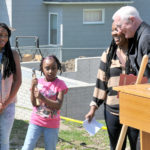Bishop Richard Pates
Life Issues
(This article is the final in a series from the bishops of Iowa on “end of life” issues.)

Pope Francis often refers to traveling the journey with the vulnerable, especially in this Jubilee Year of Mercy. But what does it concretely look like to accompany those who suffer, or, as Pope Francis phrased it, engage in the “mission of affectionately and tenderly caring for the sick and dying?“ More personally, how do we make faith-filled and clinically informed decisions about our own care when we end up facing a difficult health condition?
To begin, we must prayerfully consider the options that are available when we or those whom we love receive difficult news. Most commonly, health care professionals use terms like palliative care, comfort measures, or hospice. Each of these alternatives is in accord with Catholic teaching and can bring peace to both the patient and family, but understanding the terms is a first critical step.
Palliative care supports people who are seriously ill, with the goal of improving the quality of life for both the patient and the family. A palliative care team normally includes doctors, nurses and support staff who work to relieve patients of pain and who address the stresses associated with health issues. Palliative care is appropriate at any stage of an illness and allows for fullness of life even in the midst of illness.
A second option, hospice care, provides comfort and support to patients with advanced illness as well as to their families. Hospice care is specifically for patients with a terminal condition who will live six months or less if the illness or condition runs its normal course. While receiving hospice care, patients can live at home, at a home-like hospice residence or in a nursing home.
Comfort care is a term you most frequently hear in a hospital setting. It is often used when all options for cure have been exhausted and the goal of all who are involved is to keep the patient comfortable. Though no aggressive treatments are continued, comfort care does not mean “giving up.” Instead, the health care team provides relief on all levels — physical, spiritual, and emotional — as one nears the natural end of life.
The methods of care discussed above are all fully in line with the moral teachings of the church. As Catholics, we should do all that we can to familiarize ourselves with the church’s guidance on these matters, so that we can be prepared to navigate the morally complex situations in serious illness as well as those that arise at the end of life.
One benefit of seeking treatment from Catholic healthcare facilities is that the physicians, nurses, and chaplains employed there are committed to offering care and counsel according to the approved ethical directives of the church.
Healing the sick was an integral part of Jesus’ earthly ministry. Jesus wept when he was confronted with the death of a friend (John 11:32-37), and he had compassion for the sick who were brought to him (Matt. 14:14). Care for those very seriously ill and who are dying is one of the ways that we follow the example of our Lord in living out our mission as the body of Christ.
Today, certain social currents are making it increasingly challenging to provide end-of-life care that respects the dignity of each person. We can offer powerful testimony to the Gospel by defending the dignity of human life from conception until natural death, and by making faithful decisions about end-of-ife care for ourselves and our loved ones.
There are numerous resources available to help us better inform our consciences on these matters. During this Year of Mercy, let us redouble our efforts to know and live the truth in this area of our lives, so that others might see our good works and glorify our Father who is in heaven (Matt. 5:16).
Recommended resources:
• Ethical and Religious Directives for Catholic Healthcare Services (USCCB):
http://www.usccb.org/issues-and-action/human-life-and-dignity/health-care/upload/Ethical-Religious-Directives-Catholic-Health-Care-Services-fifth-edition-2009.pdf
• Evangelium Vitae, by Pope John Paul II:
http://w2.vatican.va/content/john-paul-ii/en/encyclicals/documents/ hf_jp-ii_enc_25031995_evangelium-vitae.html
Article prepared in consultation with Des Moines Diocesan Supportive Care Iowa Team.
(Bishop Richard Pates is bishop of the Diocese of Des Moines.)










